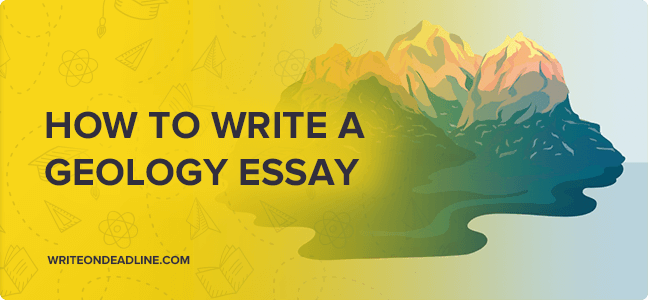How to Write a Geology Essay

Table of Contents
Introduction to Geology Essays
What Constitutes a Geology Essay
A geology essay is an academic piece of writing that presents data and research findings on geological topics. It aims to explore and analyze geological phenomena, such as earth materials, processes, history, and structures.
Significance in Geology Studies and Research
Essays in geology contribute to a deeper understanding of Earth’s systems. They are critical for sharing new findings, debating theories, and providing educational material for both the academic community and the public.
Understanding the Assignment
Deciphering Essay Prompts and Questions
Start by carefully reading the essay prompt. Identify key terms and concepts that outline the scope of your research. This ensures that your essay remains focused and relevant.
Guidelines for Determining Scope and Objectives
Define what the essay aims to accomplish. Establish clear objectives, such as explaining a concept, arguing a position, or presenting research findings. The scope should align with the essay’s length and complexity.
Research Methods for Geology
Sourcing Credible Geological Data and Literature
Use reputable scientific databases and journals to gather data. Consider the source’s credibility, relevance, and date of publication to ensure that your essay is built upon accurate and up-to-date information.
Techniques for Fieldwork and Laboratory Research
If your essay requires primary data, describe the fieldwork and laboratory methods used. Explain how samples were collected, experiments conducted, and data recorded.
Essay Structure
Detailed Breakdown of Structure
The structure of a geology essay typically includes:
- Introduction: Sets the stage with background information, defines terms, and states the thesis.
- Main Body: Presents arguments and data in a coherent manner, with each paragraph focusing on a single idea.
- Conclusion: Summarizes the essay’s key points and restates the thesis in light of the evidence presented.
Importance of a Thesis Statement
The thesis statement is your essay’s anchor; it presents your main argument or standpoint. It guides the reader on what to expect and keeps your writing focused.
Organizing Arguments and Data Effectively
Structure your main body so that each argument or piece of data logically follows the last. Use headings and subheadings to break down the sections. Bullet points and numbered lists can clarify points or steps in a process.
Enhancing Readability
Employ visual aids like charts, maps, and figures to illustrate complex data. Ensure that all visual elements are clearly labeled and referenced in the text.
Conclusion
Conclude your essay by reflecting on the implications of your findings, suggesting areas for further research, and reinforcing the importance of the topic within the field of geology.
Writing Techniques Specific to Geology
Incorporating Geology Terminology and Concepts
When writing a geology essay, use specific geological terminology to convey concepts accurately. Familiarize yourself with key terms and ensure their correct application. Avoid overly technical language that may alienate readers unfamiliar with geology.
Describing Geological Processes, Time Scales, and Features
Geological processes often span vast time scales and involve complex features. Describe these processes step by step, and use analogies where appropriate to aid understanding. Time scales should be clearly explained, potentially with a time chart or stratigraphic column for visualization.
Data Analysis and Presentation
Best Practices for Analyzing Geological Data
Analyze data methodically, using statistical tools and software when necessary. Interpretation of data should be unbiased and supported by evidence. Cross-check data points to ensure consistency and reliability.
Guidelines for Presenting Data in Tables, Graphs, and Figures
Data should be presented in a clear and organized manner. Tables, graphs, and figures must be labeled with titles, axes descriptions, legends, and sources. Choose the type of visual representation that best conveys the information—pie charts for proportions, line graphs for trends over time, and tables for detailed numerical data.
Referencing and Citation Standards
Overview of Citation Style Preferred in Geological Writing
Geological writing often adheres to the American Psychological Association (APA) style for citations and references, though this may vary by publication or institution. Confirm the preferred style with your instructor or publication guidelines.
How to Cite Sources Correctly and Avoid Plagiarism
Cite all sources of information, including data, theories, and direct quotes. Paraphrase where possible, and always attribute ideas to their original authors. Utilize citation tools or software to manage your references and ensure accuracy.
Revision and Proofreading
Strategies for Reviewing and Refining the Essay
After completing a draft, take a break before reviewing to approach it with fresh eyes. Check the logical flow of arguments, clarity of data presentation, and relevance of all included information. Seek feedback from peers or mentors.
Tips for Grammar, Punctuation, and Style Specific to Scientific Writing
Scientific writing requires precision and clarity. Use active voice where possible, and opt for past tense when describing completed research. Avoid unnecessary jargon, and ensure that punctuation and grammar are correct to maintain professionalism and readability.
Conclusion
How to Effectively Summarize Findings and Arguments
The conclusion should succinctly summarize the main findings and reinforce the significance of the essay’s arguments. Restate the thesis in the context of the evidence presented.
The Importance of Contributing New Insights or Perspectives
A strong conclusion offers something beyond a summary—new insights, implications for future research, or reflections on the broader impact of the findings. It should leave the reader with a clear understanding of the essay’s contribution to geological knowledge.

